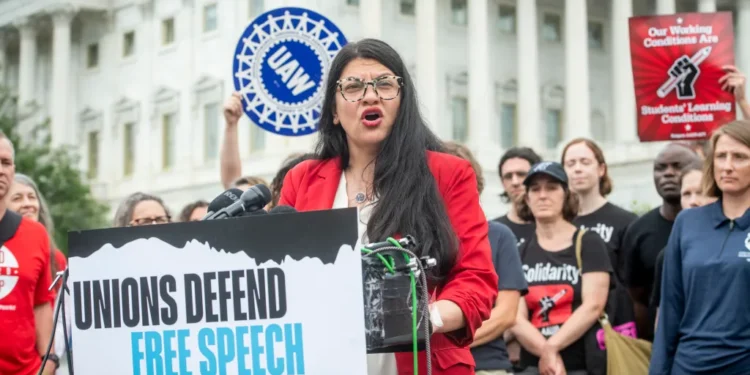At a recent United Auto Workers (UAW) rally in Detroit, U.S. Congresswoman Rashida Tlaib made headlines by refraining from endorsing Vice President Kamala Harris, a decision that reflects the complexities within the Democratic Party surrounding the Gaza conflict. As the first Palestinian-American woman elected to Congress, Tlaib has a unique voice and strong influence, particularly within Michigan’s sizable Arab American community. Her non-endorsement of Harris, a member of the Biden administration, sends a powerful message just as the 2024 elections near.
Tlaib’s decision stands out, especially as her fellow members of the progressive “Squad” — Ayanna Pressley, Ilhan Omar, and Alexandria Ocasio-Cortez — endorsed Harris earlier this year. Tlaib’s divergence highlights a growing rift within the Democratic Party regarding U.S. policy on Palestine and Israel, a conflict that has gained urgency with ongoing violence in Gaza.
Rallying Against Corporate Influence and Expressing Frustration
At the UAW rally, Tlaib passionately encouraged voters to take action. “Don’t underestimate the power you all have,” she said, urging attendees to resist corporate interests that harm workers. This message resonated with the crowd, especially given Michigan’s history of labor activism.
Despite her focus on labor issues, Tlaib did not shy away from addressing her frustration with the Democratic Party’s stance on Gaza. In a recent interview with Zeteo, she expressed a deep sense of exclusion and disappointment, saying, “Our trauma and pain feel unseen and ignored by both parties. One party uses our identity as a slur, and the other refuses to hear from us. Where is the shared humanity? Ignoring us won’t stop the genocide.”
Rising Concerns Among Michigan’s Arab American Voters
Michigan’s Arab American community has long been an influential voting bloc, and their concerns over U.S. foreign policy in the Middle East have intensified with the Gaza conflict. Tlaib’s position amplifies the sentiments of many who feel overlooked by mainstream politics. In her social media comments, she recently criticized the Biden administration’s policy, accusing it of supporting what she described as “genocide.”
Harris Faces Scrutiny for Gaza Policies
Vice President Harris, while endorsing Israel’s right to self-defense, has also called for an end to violence, acknowledging Palestinian rights to “dignity and security.” Nonetheless, Harris has faced protests from activists, particularly over demands for an arms embargo on Israel. As a leading figure within the Biden administration, her stance has garnered mixed reactions from progressives, further complicating the party’s approach to Middle Eastern issues.
The Stakes of Michigan’s Arab American Vote in 2024
The Democratic Party remains cautious, especially given Michigan’s role in previous elections. In 2016, third-party votes in states like Michigan and Wisconsin contributed to Hillary Clinton’s narrow loss. Democrats fear a similar outcome in 2024 if divisions persist within their base. Tlaib’s vocal discontent with current policy, combined with her appeal among Arab American voters, could influence the election outcome in this key battleground state.
As the 2024 election season intensifies, the stance of Arab American voters in Michigan will be critical. Tlaib’s pointed criticism of the administration’s foreign policy approach and her decision not to endorse Harris reflect broader discontent that the Democratic Party may need to address to maintain unity and secure the vote.
Related news:
US lawmaker Rashida Tlaib slams racist image of her with exploding pager
Rashida Tlaib Holds ‘War Criminal’ Sign at Netanyahu Address
Rashida Tlaib’s Bold Stand: Defending Palestinian Rights Amidst Congressional Censure Motion
















